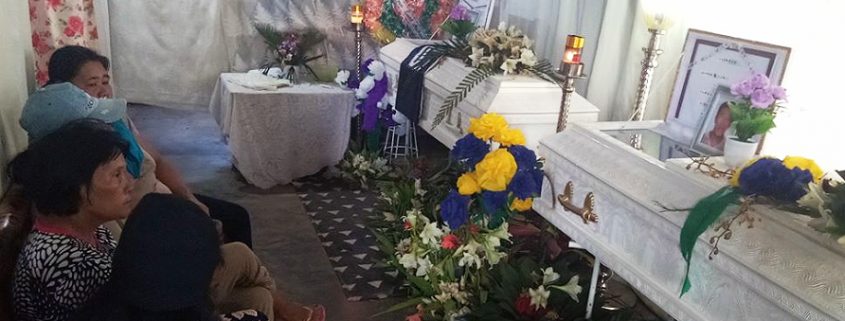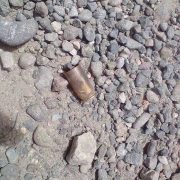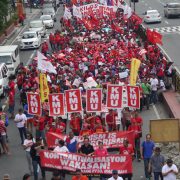Survivors’ tales show ‘most evil intentions’ in Negros Oriental killings
Visayas Today
MANJUYOD/CANLAON CITY – “Sige na, sige na!” (Go ahead, go ahead!)
These words, followed by three shots – all she managed to count in her panic – and Angenate Acabal knew her husband Valentin, 47, was dead inside their home in Manjuyod town, Negros Oriental.
Some 125 kilometers north of there, around the same time, in Canlaon City, ordered out of her home at gunpoint, Carmela Avelino heard a shout in a mix of Tagalog and Bisaya: “Merong kalaban, nagsukol!” (There’s an enemy, he’s fighting back!)
Again, three shots and she knew Edgardo, 59, her husband, was gone.
Next door, Ismael, Edgardo’s 53-year old brother, uttered his last words, addressed to his 10-year old child, as his wife Leonora and two youngest children, the other 5, were herded out their house by armed men: “Indi pagpabay-i si Mama kag utod nimo.” (Don’t leave your mother and sister alone!)
As Leonora stepped outside their smashed door, she heard a burst of gunfire.

As dawn broke on March 30, 14 men in all had died during pre-dawn raids by police commandos – eight in Canlaon, four in Manjuyod, two more in Sta. Catalina town – during what authorities initially called an “anti-crime operation” but later acknowledged was targeted against suspected communist rebels.
Even on an island beset by outbreaks of violence from an insurgency fueled by the vast gulf between the hacienderos, the planters, who own and control the vast sugarcane plantations that are Negros’ lifeblood and the landless farmers and laborers who toil for them, the single day’s toll came as a bad enough shock that Negros Oriental Governor Roel Degamo demanded police explain why so many needed to die.
Police claimed all the dead were rebel assassins, members of the New People’s Army Special Partisan Unit or SPARU, all supposedly wanted for carrying out attacks on government forces, who were killed when they chose to shoot it out against officers serving arrest or search warrants.
Malacanang stood by the police, insisting the operation was legitimate.
Never mind that many of the dead were in their 50s to late 60s, way too old to be the communist hitmen, who tend to be young, quick and agile, police claim they were, and two of those slain in Manjuyod were elected village chieftains – Valentin Acabal and Sonny Palactiw.Of the eight men killed in Canlaon, one was a Catholic lay minister and two – one of two father-and-son pairs – volunteer church workers.
As far as can be ascertained, only four of the dead – the Avelino brothers of Canlaon, Franklin Lariosa of Sta. Catalina, and Steve Arapoc of Manjuyod – belonged to peasant groups openly accused by state security forces of supporting or being “legal fronts” of the rebels.
And only the Avelinos appear to have been engaged in any recent activity that might have earned them the ire of authorities – the local farmers’ organization chaired by Edgardo hosted a forum about residents of neighboring Guihulngan City who had been displaced in December last year by a police operation similar to that of March 30.
Incidentally, police gave both operations the same code name – Sauron, the “dark lord” of The Lord of the Rings trilogy – with the March operation dubbed “2.0”.
And both operations involved not local police forces but units under the Central Visayas command based in Cebu City.
Aside from this, the warrants were also issued by courts in Cebu City, not in Negros Oriental. The separate but almost uniform accounts of Angenate Acabal and the Avelino widows, who do not know each other – as well as the stories the families of other victims told human rights organizations – not only belied the police accounts but, according to human rights lawyer Neri Colmenares, who visited the wakes of the three victims, showed “the most evil intentions,” the carefully coordinated “state-sponsored killings” of activists and others deemed “enemies of the state.”
All the stories begin in the dark before dawn – between 2 a.m. and 4 a.m. – with the sound of doors being smashed in and then armed men in tactical gear, their faces covered in balaclavas and even dark glasses, storming in, assault rifles aimed at stunned residents.

Around 20 armed men burst into the Acabal household and roused the 17-year old son who slept on a couch in the living room, ordering him to kneel, his hands clasped behind his neck. It was a position he would keep for more than two hours.
Other policemen then barged into the room where Valentin, who was sick with the flu, and Angenate slept with their 7-year old daughter, ordering them to kneel on the floor with their hands up.
“All three of us were praying and our daughter begged them not to hurt us,” Angenate said after sending the girl to another room so she would not have to listen to the retelling.
“Then they grabbed and my daughter and forced us out of the room.”The last thing she heard Valentin say was a prayer: “Gino-o, gitugyan nako kanimo ang tanan.” (Lord, I leave everything up to you.)
For two hours, Angenate said she and her children were kept under guard in the living room, not allowed near the room where her husband lay dead, and accompanied even on trips to the toilet.
It was only around 6 a.m., as curious villagers began to gather, that the policemen summoned two councilmen. Only then did they show a search warrant and the .45 caliber pistol the village chief was supposedly armed with.
Angenate said one of the policemen who guarded them asked her what her husband’s name was. When she told him, “he shook his head and said, ‘But in the blotter it was Eric’.”
A copy of the warrant, which she obtained later, did show it was for Eric, not Avelino, Acabal. Colmenares said even if Acabal used to be called by his old nickname Eric, “the warrant should reflect his real name, Avelino. This already makes it irregular.”
Shortly after, Angenate said, policemen from the town arrived “but only to take away my husband’s body to the hospital even though it was clear he was already dead” from at least seven gunshots, including one that shattered his femur and genitals.
“There was no attempt to investigate the scene of the crime. The (police) Scene of Crime Operatives only inspected his body at the hospital.”

Worse, said Arcabal’s son Argie, a Qatar Airways cabin crew who flew home on learning of his father’s fate, “they took P30,000 I had just sent home for home repairs and even P7,000 that my mother was keeping for our church, of which she was treasurer.”
Meanwhile in Canlaon, Carmela Avelino was awakened by her 16-year old daughter’s shout for help and rushed out thinking a snake had crawled into their house.
As she got out of bed, “the curtains of our window parted and I saw five rifle barrels aimed at us and a voice ordered us out of the room.”
In the dirt-floor front room, “five policemen stood in line, blocking me from my husband, while others ordered me and the children outside and to go to the community center next door.”
On their way out, they heard three shots from their house and, moments later, more gunshots from Ismael’s house.

Leonora said she and her two young children were awakened by the commotion from Edgardo’s house and stepped out of their room to see their door burst open as six hooded men in black entered and ordered them to lie on the floor at gunpoint.
They were then ordered out of their home and to crawl toward another house where they were kept under guard for the next three hours.
Another Avelino brother, Efraim, rushed out of his nearby house only to be grabbed by his neck and pushed back inside by a gunman in a uniform of the police Special Action Force who ordered him back inside or “you might be the first.”
Like Valentin Acabal, the bodies of the Avelino brothers would be taken from their homes hours later, after daybreak, and taken to the local hospital even though they had already been dead for hours.

Edgardo had been shot in the forehead and right arm. Ismael suffered at least five gunshot wounds.
But unlike Acabal, who has not been autopsied, the Avelino brothers underwent a post-mortem examination and had their deaths classified as “homicide” by the Canlaon civil registrar. Only after the ambulance had left were village officials summoned and shown warrants.
Carmela said the warrant for Edgardo gave his family name as “Marquez,” which is his middle name, and not Avelino.
She said the policemen then asked her to accompany them inside the house and showed her a .45 caliber pistol lying in the pool of blood where her husband had fallen and an M16 rifle they supposedly found by a closet.
A policeman also “returned” money taken from their home, only to find out that P2,000 was missing from the original P5,000.

A sister of the Avelinos, Azucena Garubat, was arrested for allegedly possessing a .38 caliber revolver and remains detained at the Canlaon police station, together with Corazon Javier, a coordinator of activist women’s group Gabriela, who was allegedly found in possession of a rifle grenade.
The two were among 12 persons nabbed in the course of the March 30 operation.
Reacting to the accounts of the widows, Colmenares said it was “clear the operations were irregular. The fact alone that they wore masks to serve supposed warrants proves this. And there is also the total lack of an investigation after the deaths, which indicates that the police have no intention whatsoever to tell the truth about what happened.”
But while confident about the chances of successfully prosecuting the police personnel involved in the bloody operation, Colmenares said this would not be enough.
“Public uproar is crucial to send the message that enough is enough.”He also said that ultimate responsibility for the March 30 deaths, as for the December deaths, lay with President Rodrigo Duterte, who last year issued Memorandum Order No. 32, which ordered more police and military personnel to the Bicol region, Samar island and Negros to “quell lawless violence.”
Colmenares said the actions of Duterte and the police fell into the “three patterns of evidence” he said were the bases for successful prosecutions involving extrajudicial killings:
· “Public vilification, which establishes motive”;
· “The brazenness with which the crime is committed”; and
· “The complete lack of interest to investigate o prosecute”
COVER PHOTO: Leonora Avelino (partly hidden, top) talks to visitors at the wake of her husband, Ismael, and his brother, Edgardo in Barangay Panubigan, Canlaon City.







